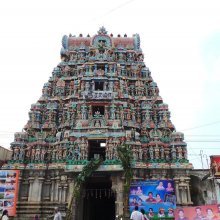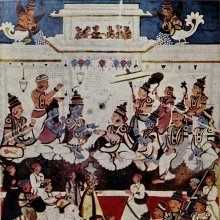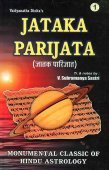Dikshita, Dīkṣita: 22 definitions
Introduction:
Dikshita means something in Hinduism, Sanskrit, the history of ancient India, Marathi, Hindi. If you want to know the exact meaning, history, etymology or English translation of this term then check out the descriptions on this page. Add your comment or reference to a book if you want to contribute to this summary article.
Dikshita has 21 English definitions available.
The Sanskrit term Dīkṣita can be transliterated into English as Diksita or Dikshita, using the IAST transliteration scheme (?).
Alternative spellings of this word include Dikshit.
Images (photo gallery)
Languages of India and abroad
Sanskrit dictionary
[Deutsch Wörterbuch]
Source: Cologne Digital Sanskrit Dictionaries: Böhtlingk and Roth Grosses Petersburger WörterbuchDīkṣita (दीक्षित):—(partic. vom caus. von dīkṣ, nach gaṇa tārakādi zu [Pāṇini’s acht Bücher 5, 2, 36] von dīkṣā) adj. der die Weihen empfangen hat [Amarakoṣa 2, 7, 7.] [Hemacandra’s Abhidhānacintāmaṇi 817.] [Vājasaneyisaṃhitā 20, 24.] [Atharvavedasaṃhitā 10, 10, 12. 11, 5, 6.] [Aitareyabrāhmaṇa 1, 3. 6, 7. 7, 25.] [The Śatapathabrāhmaṇa 3, 1, 1, 7. 10. 3, 28. 9, 5, 1, 1.] [Aśvalāyana’s Śrautasūtrāni 6, 9. 12, 4.] saṃvatsarāya [The Śatapathabrāhmaṇa 12, 2, 2, 8.] vrata [Kātyāyana’s Śrautasūtrāṇi 4, 6, 13.] adīkṣitā dīkṣitaṃ yājayanti [Śāṅkhāyana’s Śrautasūtrāṇi 16, 20, 7.] vasana n. das Gewand eines Geweihten [The Śatapathabrāhmaṇa 2, 5, 2, 47. 3, 1, 2, 18. 3, 6. 5, 2, 1, 8.] [Śāṅkhāyana’s Śrautasūtrāṇi 18, 24, 4.] vāda m. [Taittirīyasaṃhitā 3, 1, 1, 1. -] [Manu’s Gesetzbuch 2, 128. 4, 130. 210. 8, 360.] [Yājñavalkya’s Gesetzbuch 3, 28.] [Mahābhārata 1, 8140. 2, 1248.] varṇānāṃ brāhmaṇaścāsi viprāṇāṃ dīkṣito dvijaḥ [13, 918. 14, 1179.] [Rāmāyaṇa 1, 40, 16. 42, 24. 3, 49, 19. 70, 15.] [Bhāgavatapurāṇa 4, 27, 11. 6, 11, 15.] [Prabodhacandrodaja 19, 14.] dīkṣitaḥ śivamantreṇa [Pañcatantra I, 183.] sāṃvatsaradīkṣāyāṃ dīkṣitaḥ [Harivaṃśa 7995.] dīkṣitaṃ yajñakarmasu [Mahābhārata 9, 2105.] āpannābhayasattreṣu dīkṣitāḥ khalu pauravāḥ [Śākuntala 49.] aśvamedhāya dīkṣitaḥ [Mahābhārata 3, 12677. 1, 2208.] [Raghuvaṃśa 8, 74.] [Bhāgavatapurāṇa 1, 17, 45.] hayamedhena [Mahābhārata 3, 8859.] bhavati narapayoge dīkṣitaḥ pārthivendraḥ [Varāhamihira’s Bṛhajjātaka 15, 4.] sāmrājya [Raghuvaṃśa 4, 5.] Uneig. so v. a. vorbereitet zu Etwas, bereit zu: raṇadīkṣābhirdīkṣitāḥ [Mahābhārata 7, 3588.] yodhayantaḥ parasparaṃ yamarāṣṭrāya mahate paralokāya dīkṣitāḥ [6606.] tataḥ parājitāḥ pārthā vanavāsāya dīkṣitāḥ . ajinānyuttarīyāṇi jagṛhuśca yathākramam .. [2, 2514. 15, 358.] [Rāmāyaṇa Gorresio 2, 23, 25. 6, 104, 19.] (tam) viśvāsya dīkṣitaṃ kṛtvā einweihen, vertraut machen [Kathāsaritsāgara 20, 198.] Häufig am Ende von Personennamen (wohl von Brahmanen) nach einem anderen Personennamen (der von dem und dem Geweihte); so z. B. in apyaya, bhaṭṭoji, bhānujī, śaṃkara . Nicht selten wird der Kürze wegen der vorangehende Name weggelassen; vgl. [Bhāgavatapurāṇa I, LXIV.] [Weber’s Verzeichniss No. 751.] [Oxforder Handschriften No. 415.] [Śabdakalpadruma] führt aus dem Kāśīkhaṇḍa 13 eine Stelle an, in der Dikṣita als Beiname eines Brahmanen Yajñadatta in der Stadt Kāmpilla erscheint. Am Anf. eines Personennamens in ḍhuṇḍhirāja und bālakṛṣṇa [Oxforder Handschriften No. 285.]
--- OR ---
Dīkṣita (दीक्षित):—, kratu [Varāhamihira’s Bṛhajjātaka S. 17, 15.]
Source: Cologne Digital Sanskrit Dictionaries: Sanskrit-Wörterbuch in kürzerer FassungDīkṣita (दीक्षित):—Adj. —
1) der die Weihen erhalten hat , geweiht zu (Dat. , Loc. , Instr. oder im Comp. vorangehend). f. dīkṣitī [Gopathabrāhmaṇa 1,5,24.] Nom.abstr. dīkṣitatva n. [Jaimini's Mimāṃsādarśana 6,5,39.] —
2) vorbereitet — , bereit zu (Dat. , Instr. oder im Comp. vorangehend) [Rājataraṃgiṇī 8,1503.] dīkṣitaṃ kar Jmd einweihen , vertraut machen. —
3) häufig am Anf. und Ende von Personennamen ; der Kürze wegen auch mit Weglassung des eigentlichen Namens.
Sanskrit, also spelled संस्कृतम् (saṃskṛtam), is an ancient language of India commonly seen as the grandmother of the Indo-European language family (even English!). Closely allied with Prakrit and Pali, Sanskrit is more exhaustive in both grammar and terms and has the most extensive collection of literature in the world, greatly surpassing its sister-languages Greek and Latin.
See also (Relevant definitions)
Starts with (+4): Dikshita ananta, Dikshita balakrishna, Dikshita cakrapani, Dikshita damodara, Dikshita devadatta, Dikshita dhundhiraja, Dikshita samvatsara, Dikshita shri harsha, Dikshita shrikantha sharman, Dikshitabalakrishna, Dikshitabrahmana, Dikshitadhundhiraja, Dikshitar, Dikshitasamaraja, Dikshitatana, Dikshitatman, Dikshitatva, Dikshitavada, Dikshitavasana, Dikshitavedana.
Ends with (+151): Accadikshita, Acchadikshita, Adavashukla dikshita, Adikshita, Akshadikshita, Ananta dikshita, Annadikshita, Apayyadikshita, Appa dikshita, Appadikshita, Appaidikshita, Appayadikshita, Appayya dikshita, Appayyadikshita, Appidikshita, Apyadikshita, Apyaidikshita, Apyayadikshita, Apyo dikshita, Ayadikshita.
Full-text (+762): Diksh, Yajnanarayana, Praudhamanorama, Shaivakalpadruma, Bubasharman, Nilakanthavijayacampu, Kundamandapasiddhi, Virashaiva, Govindadikshita, Balamanorama, Sri Rangarajadhwari, Sudhanjana, Shabdabhedanirupana, Rangaraja, Lakshmidhara, Kuvalayananda, Gudhaphakkikaprakasha, Apyo dikshita, Nilakanthamakhin, Raghunandana.
Relevant text
Search found 56 books and stories containing Dikshita, Dīkṣita, Diksita; (plurals include: Dikshitas, Dīkṣitas, Diksitas). You can also click to the full overview containing English textual excerpts. Below are direct links for the most relevant articles:
Sanskrit sources of Kerala history (by Suma Parappattoli)
11. Prakriyasarvasva by Melpathur Narayana Bhattathiri < [Chapter 6 - Miscellaneous Sanskrit works bearing on Kerala history]
13. Ramavarma-Yasobhusana by Sadasiva-Diksita < [Chapter 6 - Miscellaneous Sanskrit works bearing on Kerala history]
10. Vasulaksmikalyana by Venkata Subrahmanya Dhavarin < [Chapter 5 - Sanskrit Dramas and Campus bearing on Kerala History]
Hindu Pluralism (by Elaine M. Fisher)
The Public Theologians of Early Modern South India < [Chapter 1 - Hindu Sectarianism: Difference in Unity]
The Making of a Hindu Sectarian Community < [Conclusion—A Prehistory of Hindu Pluralism]
Śrīvidyā and society in Nīlakaṇṭha Dīkṣita’s Saubhāgyacandrātapa < [Chapter 2 - The Making of the Smārta-Śaiva Community of South India]
Amarakoshodghatana of Kshirasvamin (study) (by A. Yamuna Devi)
Vedic Sacrifices < [Chapter 4 - Cultural Aspects]
Critical comments by Bhānuji Dīkṣita on certain derivations of Kṣīrasvāmin < [Chapter 6 - Grammatical Aspects]
Deviation from convention (Introduction) < [Chapter 6 - Grammatical Aspects]
Jivanandana of Anandaraya Makhin (Study) (by G. D. Jayalakshmi)
Family of Ānandarāya Makhin < [Chapter 2 - Author, His Life and Works]
Establishing the Authorship of Ānandarāya Makhin < [Chapter 2 - Author, His Life and Works]
Life of Ānandarāya Makhin < [Chapter 2 - Author, His Life and Works]
Manusmriti with the Commentary of Medhatithi (by Ganganatha Jha)
Verse 4.210 < [Section XIV - Other Duties]
Verse 2.128 < [Section XXIII - Rules regarding Salutation]
Preceptors of Advaita (by T. M. P. Mahadevan)
Related products




